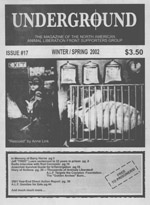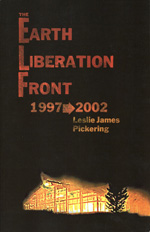The Archives
-
Books
Earth Liberation Front 97-02
05.20.13 | PermalinkEarth Liberation Front 1997-2002 (2003. Second printing with new dedication and layout 2007. Portland, OR)
Leslie James Pickering grew up in Buffalo, NY. In the mid 90s he became involved in the local hardcore music scene. While attending shows in the surrounding area, he began reading the literature distributed there by local animal rights groups. Zines such as Holocaust (published by Animal Defense League founder Kris Qua) were his introduction to radical politics and support for underground direct action.
Like most kids who grow up in smaller cities, Leslie James left Buffalo as soon as he had the means. After a brief stint skateboarding in San Francisco (during which time he filmed for the underground skate video rarity “Heat Zone”) Pickering landed in Portland, OR. There, he met Craig Rosebraugh, and after a few years the two of them began publishing a newspaper called Resistance with other members of a group called Liberation Collective. At this same time, a group calling themselves the Earth Liberation Front began a series of arson attacks against companies involved in logging and other environmentally harmful practices. They sent their first media statement to Liberation Collective, and the rest of the story is what Pickering documents in Earth Liberation Front 97-02.
Consisting of reprints, interviews, and some original material, Earth Liberation Front 97-02 is a must read for those who wish to understand the beginnings of the Green Scare.
…
-
One-off publications
North American Earth Liberation Front Press Office Subcommittee on Eco-Terrorism
05.22.12 | PermalinkNorth American Earth Liberation Front Press Office Subcommittee on Eco-Terrorism (2002, Portland, OR)
One of the most frequently repeated myths about direct action is that is so damaging to public opinion that if people didn’t already do it, the government would in order to criminalize movements. If this were true it certainly seems that the system would spend less time trying to prevent radical action by silencing it’s proponents and more time harassing the Sierra Club. The truth is that nothing scares corporations and their paid-in-full politician pets like a well organized group with a willingness to fight and the ability to reach the public with their ideas.
In the late 1990s environmental sabotage was happening all across the world, but was particularly frequent in the northwest of the United States. At the forefront of these actions was the Earth Liberation Front, an anonymous, underground group, who utilized above ground spokespeople to reach the public. Their primary conduit for media relations was an activist from Portland named Craig Rosebraugh and his organization, the North American ELF Press Office. For his role in publicizing the motivations and rhetoric of the ELF he had his arm broken by the police, his home raided by Joint Terrorism Task Forces, his break cables cut, was repeatedly subpoenaed to grand juries, and eventually was called to testify before a congressional sub-committee who hoped to imprison him on contempt charges. The so-called “Eco-Terror committee” surely hoped that Craig would be an easy target, but that didn’t exactly work out for them. Snarky, educated, and angry, Craig’s testimony ran the gamut from stonewalling, to educational, to hilarious. For example, while running the Press Office with his friend Leslie James Pickering, Craig owned a bakery. When asked how the press office was funded, Rosebraugh simply replied “muffins.” When asked who had asked him to become the ELF press officer and how he was contacted, Craig responded, “Jesus Christ. It was a spiritual sort of thing.”
Jokes aside, a congressional subpoena represented a shift in the way environmental sabotage was being treated by the system, and publicizing that fact fell to Leslie James Pickering. In order to spread the word about the hearings, the NAELFPO sold a DIY booklet containing all of the testimony presented by both sides at the hearing and the subsequent written questions sent to Craig by the subcommittee. In a recent conversation with Conflict Gypsy about the booklet, Pickering had this to say:
“I can’t say for sure, how many of these were printed, but it was definitely less than 500. I had a little production line going, with people wearing gloves and hats, only half-jokingly, recently having learned about the WUO and Prairie Fire. The subcommittee was in February of 2002 and I left Portland in June of 2002. These booklets were produced somewhere in between there…probably March or April, because I utilized some machinery they had at college before the semester let out and because this was actually in peoples’ hands before it was easily found online. They were distributed through the ELF Press Office, which means that people could send us $10 and get a copy mailed, or get one at one of our event tables. A good chunk of them also went to AK distro, but we never saw a cent from those, which is another story. One of the more interesting aspects were the complaints from anonymous anarchists about it costing too much. This was when the PO was being bombarded with anonymous comments which were critical from many angles. I often think of how much work went into this and how cheap these people were, assuming for a moment that they weren’t all feds. If we didn’t have the old magnet scam going [where large magnets would be used to reset the copy keys at Kinkos – ed] we would probably have lost money at $10, because it was a pretty thick booklet.”

-
Periodicals, Underground
Underground #17
12.24.11 | PermalinkUnderground #17 (The rare ACTUAL final issue!) (2002, WIllowdale, ONT, Canada.)
Several months ago we posted Underground #16 along with the all caps tagline, “THE RARE FINAL ISSUE!” Boy, is our face red. The final issue of Underground is actually issue 17.
Much of what was said in our post about issue 16 is also true of 17- the news was late, the supporters groups was constantly dealing with the problems of rotating volunteers, and as print media was being challenged by the internet, Underground also seemed to be declining in quality. The final issue did contain some important bits of forgotten history though, like the joint resignation letter from ELF press officers Craig Rosebraugh and Leslie James Pickering, or the tiny article about Belgian animal liberation super-arsonist Geert Waegemans additional charges. There is also a wonderful transcription of Mirha-Soleil Ross’ radio interview with Rod Coronado, former ALF Press Officer (and current snitch apologist) David Barbarash’s 2001 Year End Direct Action Report, and a reprinting of the ever popular “Staying Free By Shutting the Fuck Up!”

…
-
One-off publications
FAQ About the Earth Liberation Front
04.26.11 | PermalinkFrequently Asked Questions about the Earth Liberation Front (2001, Portland, OR. USA)
This was a widely circulated pamphlet produced by the North American ELF Press Office that served more as an FAQ about the politics of the two press officers, Craig Rosebraugh and Leslie James Pickering. Because the saboteurs of the ELF were underground, they relied heavily upon their above ground counterparts to challenge false media reports, publicize their actions, and explain their ideas. A brief look at the ideologies of those later convicted for ELF actions shows that many of them were in the anti-civilization and anarchist camps, whereas the press officers representing them were more traditionally radical-left anti-capitalists influenced by animal rights and environmentalism.
While there may have been small divides in the politics of those carrying out the actions and those speaking to the media, no one can doubt that the NAELFPO fought hard, and suffered greatly, to show their support for the Earth Liberation Front. The two press officers experienced multiple grand jury subpoenas, police brutality, raids on their homes where all of their possessions were destroyed, and even attempts on their lives. Craig Rosebraugh, for example, once found the brakes of his car cut. Instead of taking him out of the fight, the repression and violence seemed to steel his resolve, and him and Leslie James both have continued to be vocal activists. This FAQ is still one of their most read publications, and we are happy to host it here at Conflict Gypsy.
…
-
Periodicals
Resistance
04.10.11 | PermalinkResistance Volume 1 #1-4, Volume 2 #1 (1999-2001. Portland, OR. USA)
Before Portland became famous for its eccentricities and vegan mini-malls, it used to be known as one of the west coast’s most active centers for direct action oriented environmental, animal, and human rights activism. Famously referred to as “little Beirut,” by the George H.W. Bush administration, Portland was the home of peace-punk bands, eco-saboteurs, and anti-government riots. Then, strangely enough, it became a hotbed of pacifism in the mid-90s thanks to the efforts of… wait for it… Craig Rosebraugh.
Craig eventually became known internationally for his support of political violence and ecotage, but for a few years he was an advocate of Gandhian nonviolence. After participating in several voluntary arrest actions, he co-founded the group Liberation Collective in 1996 as a blanket organization meant to tackle a wide variety of social ills. The group was a springboard for many well known activists, and planned a number of media spectacles across the United States, from Buy Nothing Day car smash-em-ups in busy downtown streets to the cross country Primate Freedom Tour. (The PFT was credited in large part to a group called Coalition to End Primate Experiments, but the greater part of the organizing was done by LibCo members.)
After the failure of attempts such as One Struggle to document a broad movement for ecological sanity and justice for all life, Liberation Collective took up the torch and released the first issue of Resistance. The inaugural issue was unlike any other in the series though. The main forces behind the publication, Craig and Leslie James Pickering, had politics that were no longer meshing well with the rest of the group. Liberation Collective was falling apart due to a number of factors, and ultimately LJ and Craig struck out on their own, founding the North American Earth Liberation Front Press Office and continuing the Resistance project as a newsletter of their new organization.
The third issue of Resistance launched what was to become the best source of information for a rapidly expanding underground movement. The Earth Liberation Front was becoming active across the United States, but supportive coverage could be difficult to find. Even the Earth First! Journal wasn’t always willing to support the large scale arson attacks of the ELF, and when they did they lost membership. (Famously, Julia Butterfly left Earth First! after the Journal gave positive coverage to the Vail arson.) Resistance, however, published nearly every ELF communique unedited, and covered the multiple federal investigations into the groups actions. Activists seeking a better knowledge of the events leading to the green scare and “Operation Backfire” arrests would do well to start by reading the early volumes of Resistance.





…






